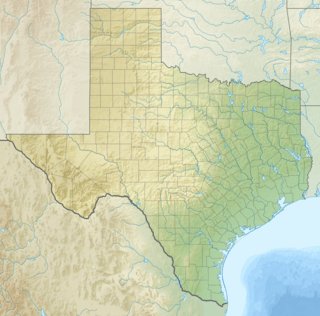Fort Graham
| Fort Graham | |
|---|---|
| Archeological & Park Site | |
|
Fort Graham Reconstructed Barracks | |
 Location within Texas | |
| Coordinates: 32°00′12.6″N 97°23′45.8″W / 32.003500°N 97.396056°WCoordinates: 32°00′12.6″N 97°23′45.8″W / 32.003500°N 97.396056°W | |
| Country | United States |
| State | Texas |
| County | Hill |
| U.S. Army Fort | March 27, 1849 |
| Elevation | 536 ft (163 m) |
| Time zone | Central (CST) (UTC-6) |
| • Summer (DST) | MDT (UTC-5) |
Fort Graham was a pioneer fort established in 1849 by Brevet Major R.A. Arnold (Companies F and I of the Second United States Dragoons)[1] at the site of Jose Maria Village, an Anadaca camp on the western edge of present-day Hill County, Texas. It remained in service until 1853, when settlements had moved further west. It was named after Col. William M. Graham, who died at the Battle of Molina del Rey.[2]
A line of seven army posts was established in 1848-49 after the Mexican War to protect the settlers of West Texas and included Fort Worth, Fort Graham, Fort Gates, Fort Croghan, Fort Martin Scott, Fort Lincoln, and Fort Duncan.[1]
Reconstruction
In 1936, the Texas Centennial Commission granted Hill County $6700 to purchase the land upon which the Fort stood and reconstruct one of the buildings.[3]
US Army Corps of Engineers and Lake Whitney
In 1953, the US Army Corps of Engineers took the fort site as part of the Lake Whitney project.[2] Dr. S. Alan Skinner published, in 1974, An Evaluation of the Archaeological Resources at Lake Whitney, Texas, Southern Methodist University contributions in anthropology No. 14. The Corps, in accordance with the 1936 dedication, operated a park on the site until 1982 at which time Hill County was forced to enter into a lease for the property or lose this culturally significant resource.
Preservation
In 1983, a group of local citizens led by Mrs. Selma Hill raised $15,000 to move the building, determined that the fort be preserved. At this time, the building was only three years from being eligible for the National Register on its own merits, but the citizens were never informed of this. Had it achieved National Register status, the Corps would have been forced to take preservative action.
The citizens of the county continued to maintain the site until 2002, when the corps came before the county demanding that a minimum of $60,000 be spent for the revitalization of the area. Hill County did not have sufficient funds, thus it relinquished the lease.
| Depictions of Fort Graham Preservation | ||||
|---|---|---|---|---|
|
Fort Graham Preservation Society
The Fort Graham Preservation Society, Inc. is a nonprofit corporation established to ensure that the memory of Fort Graham is not lost. It is currently working with federal and county agencies to preserve and revitalize Fort Graham Park and archeological site.
See also
References
- 1 2 Crimmins, Col. M. L. (1943). "The First Line of Army Posts Established in West Texas in 1849". West Texas Historical Association. Texas Tech University. pp. 121–127.
- 1 2 Fort Graham from the Handbook of Texas Online
- ↑ "Fort Graham". Fort Tours. Retrieved 2009-02-19.
External links
- "Fort Graham - Whitney ~ Marker Number: 1984". Texas Historic Sites Atlas. Texas Historical Commission. 1936.
- "U.S. Army on the Texas Frontier". Texas Beyond History. University of Texas at Austin.


